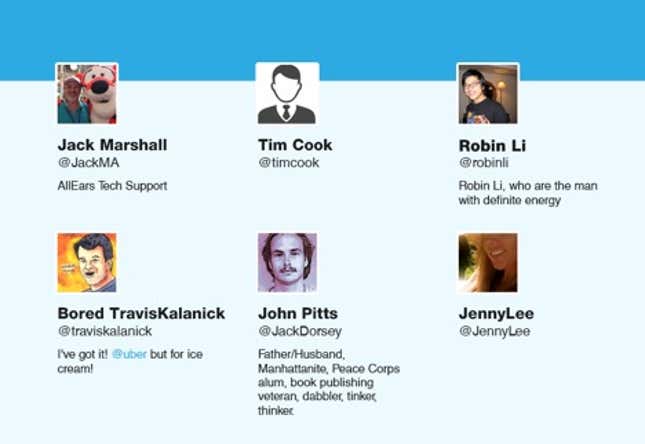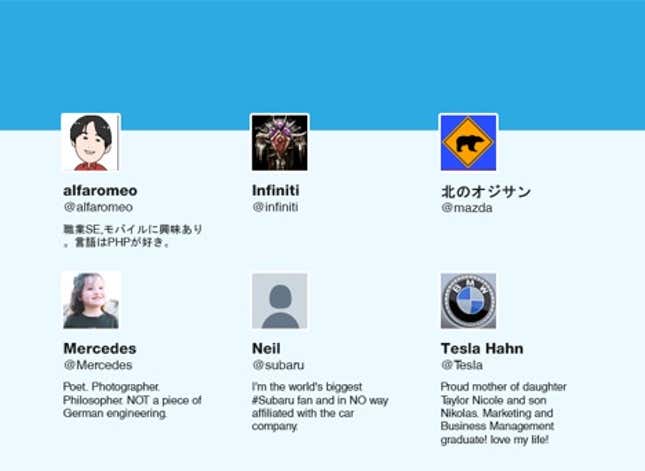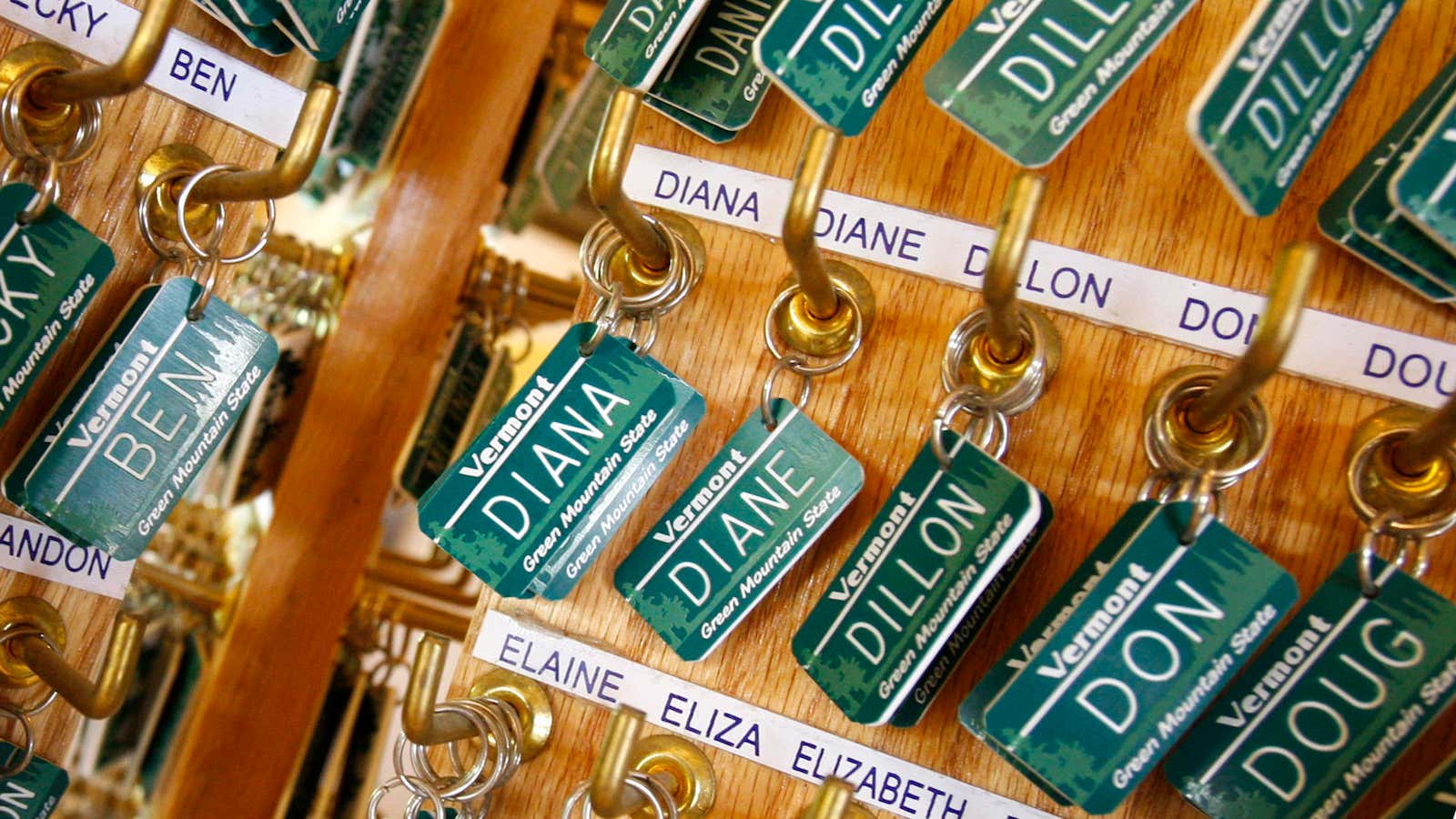The world is nearly out of good “.com” domain names—and even the fourth circuit of the United States Court of Appeals agrees.
As global internet usage rises, .com naming is going to get more and more complicated. Our languages only contain a finite number of meaningful words, so brand naming is becoming much more than coming up with a unique, snazzy moniker—it also involves knowledge of intellectual property rights, law, and a large of dash of luck.
Many well-known brands have encountered challenges securing their preferred domain names. For example, Google renamed their parent company “Alphabet,” but it doesn’t own alphabet.com—BMW does. In 2014, Microsoft spent $2.5 billion to acquire Mojang, the Swedish company behind the popular Minecraft video game, but it didn’t get the domain name minecraft.com with it—that belongs to an Australia mining-engineering company, MineCraft Consulting PTY Ltd. (Oh yeah—that Minecraft.) Meanwhile, Nissan has spent over 20 years trying to acquire nissan.com from a man named Uzi Nissan, and it took Apple 16 years to acquire apple.co.uk from a British company called Apple Illustrations.
Acronyms get even messier. Governmental organizations such as CIA.com, NSA.com, FBI.com, Mossad.com, and Mi6.com are all owned by private individuals and companies. A Google search for BOA (an acronym often used by Bank of America) may show a page covered in Bank of America listings, but a visit to BOA.com will rattle anybody with a fear of snakes. ABBA.com is not the Swedish group, but an acronym for the American Bed and Breakfast Association; DND.com isn’t owned by Dungeons and Dragons; and MOFO.com is actually safe to view at work. (It’s owned by the law firm, Morrison & Foerster).
First come, first served
So why don’t the big guys pull rank when it comes to owning their digital properties as well as their marketplace? That’s because most domain-name registries operate on a simple first-come, first-served rule for reservations and registrations. While this model is likely the only fair way to service a broad community, it has its drawbacks.
Take Tesla, for example. Most people know of Elon Musk’s company, but fewer people know it was named after Nikola Tesla, the renowned Serbian inventor. As Tesla isn’t a word created for a brand—such as Jeep, Chapstick, or Jacuzzi—it’s more likely to be adopted by others who share the same appreciation for the original inventor. For example, Tesla Tecnologia e Comunicação owns tesla.com.br (Brazil), TESLA MR Scanning operates owns tesla.dk (Denmark), Tesla CRM Software GmbH owns tesla.de (Germany), and The Tesla Company owns tesla.gr (Greece). In theory, all of these owners have just as much right to a primary Tesla domain name as the others.
Some brands have been able to acquire their preferred domain names through cash or creative equity deals, such as Uber, which agreed to trade 2% of the company’s shares to Universal Music for the domain name uber.com, or Slack, which paid $60,000 for the domain name slack.com. Others will opt for less-friendly methods such as litigation or filing a Uniform Dispute Resolution Process (UDRP). The latter involves a great risk in the case of a loss, including almost always a higher cost.
Domain names are a critical part of a company’s infrastructure, so it’s important for them to fight for them: Not only are they the storefront for a brand’s image online, but they also play a crucial role in everything from email to e-commerce. Many of today’s greatest companies even employ “global domain-name managers” who often have years of trademark and IP experience.
Let’s say you spend tens of thousands of dollars (and portion of your sanity) on securing your desired domain name—then what about wrestling back the attached social-media handles?
The real @SlimShady
It’s hard to say who the real Slim Shady is, since @slimshady hasn’t tweeted since opening his account in 2007.
Like domain names, social handles also operate on a first-come, first-served basis, causing very similar confusion throughout social platforms.
For example, when Donald Trump won the 2016 US presidential election, Mike Pence also won his slot as vice president. Another winner was a Florida man whose name did not appear on a ballot—he describes himself as a “software developer, grandpa and nature lover. Not a Christo-fascist politician.” He is also named Mike Pence, and he happens to operate the @mikepence Twitter handle.
I tried to see if Twitter co-founder @jackdorsey had anything to say about this, but I quickly realized that attempt might be futile. In fact, a whole bunch of tech leaders’ Twitter handles look a whole lot different than their real world counterparts. If the CEO of Twitter doesn’t have control over his own name’s Twitter handle, what hope do the rest of us have?

And it’s just not personal names, either. Brands are subject to others using their preferred handles with almost no recourse.

Social handles are often more challenging to acquire than domain names as there are fewer resolution methods available for an acquisition. Buying a social handle can be tricky, and selling a Twitter handle is actually against Twitter’s rules. For the most part, any decision to release or transfer a handle is left in the hands of the social handle’s owner. Some people, like Haje Jan Kamps, have used trademark law to find creative ways to acquire their handle for the cost of an application fee. However, successful attempts are few and far between.
The future of .com
To counteract these challenges, brands have started investing in branded digital-naming solutions for the future.
In 2014, ICANN—the Internet Corporation for Assigned Names and Numbers, which oversees primary DNS and IP regulation, maintenance, and co-ordination for the internet—introduced a series of new, generic, top-level domain names (gTLDs). This added more options to an ever-shrinking pool of quality .com domain names. New domain name extensions like .club and .link have shown good success with respect to new registrations—while others like .bible and .rodeo are still trying to find a wider following. But this last round of new gTLD applications also saw over 600 brands spend more than a collective $100 million on application fees alone for brand-related domain name extensions. Nike now owns .nike, BMW owns .bmw, and McDonald’s even owns .mcdonalds, which is a full 180-degree turn from 1994, when Joshua Quittner tried to get the ubiquitous restaurant chain to acquire McDonalds.com.
“The thing about domain names is that they have become a precious commodity in their own right,” says David Taylor, a partner at Hogan Lovells and domain-name panellist for the World Intellectual Property Organization. “The opportunity provided by the ICANN new gTLD program has enabled many brands to move to the right of the dot, with a .brand. Given the application fee was $185,000, these are relatively costly domain names, but it’s often a cheaper option to paying large sums out to acquire a pre-registered and lovingly owned .com domain name that is being used for a genuine business or activity.”
Over the next few years, we may see the face of the internet change as more brands shift to using branded extensions. Barclay’s, Canon, and BNP Paribas are already early adopters who have made the move, taking control over everything to the left of the dot. When a brand owns an entire extension and can actually control who can register, it puts a lot more power in their hands. Applications for new gTLDs have now closed, but it shouldn’t be too long until ICANN opens up the opportunity for more branded domain names once more.
In the meantime, people will continue to call Minecraft Australia for game support, tag @mikepence in their political discussions, and question whether or not Paul Ryan is selling guitars on the side.
I’d say that you could email us at quartz.com with any questions, but then the joke would be on you.
